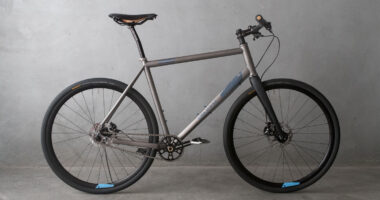Electric bikes are on the rise. They’re more convenient, cheaper than gas-powered bikes, and increasingly popular. But which electric bike to choose? How do I charge it? What’s the difference between a throttle and a pedal assist?
Electric bikes are all the rage these days, and the market is flooded with products. What’s the difference between a regular bike and an electric one, and which one should you choose? What factors do you consider when choosing an ebike, and how do they differ from a regular bike?
Because electric bikes have surged in popularity, you’d be forgiven for thinking that they were a straightforward choice. After all, how hard can it be to choose between, say, a folding e-bike, an electric mountain bike, a road bike or a city bike? Read more for our guide to e-bike types and how to choose the best one for your needs.. Read more about best electric bikes australia 2024 and let us know what you think.
Electric bikes, or ebikes as they’re sometimes called, are a popular way to add a little more assistance to your ride. An electric bike can help you maintain your pace on the flats while also providing the additional push you need to climb any hills along the route.
As more people switch to ebikes, costs are dropping, and manufacturers are introducing new models with updated features like as lighter motors and longer battery ranges.
We’re continuously adding to our collection of electric bike reviews here at BikeRadar, so if you’re looking for a particular kind of ebike or model, you’ll almost certainly find it here.
If you’re still undecided about what you want in an ebike, keep reading for a complete list of electric bike kinds and how to choose the best one for you.
From electric mountain bikes that help you reach the top of the next downhill trail to foldable city ebikes that you can carry with you on your commute, there are ebikes for every kind of riding.
We’ll go through the many kinds of ebikes, what they’re excellent for, and where you can find our buyer’s guides and top reviews for each one.
Because the variety of ebike choices is similar to that of non-motorized bikes, it’s also worth reading our best bike buyer’s guide.
The fundamentals of electric bicycles
Let’s start with the fundamentals. An electric bike is a pedal bike that has an electric motor and battery to help you as you ride.
To be legally classified as an electric bike, the motor must be activated by pedaling. The bike will be classified as a moped if it has a bar-mounted “throttle” or twist grip to regulate the power. That implies, at least in the UK and EU, it will not be eligible for tax and registration-free ownership.
Similarly, in the UK, EU, and Australia, assistance is only legal up to 15mph/25kph, after which the motor will stop out and any further speed will have to be achieved via your own efforts. If you’re reading this while riding in the United States, though, you’re in luck since your engine can go up to 20 mph.
Answers to frequent electric bike questions may be found in our ebike FAQs.
Types of electric bicycles
Road bikes with electric motors
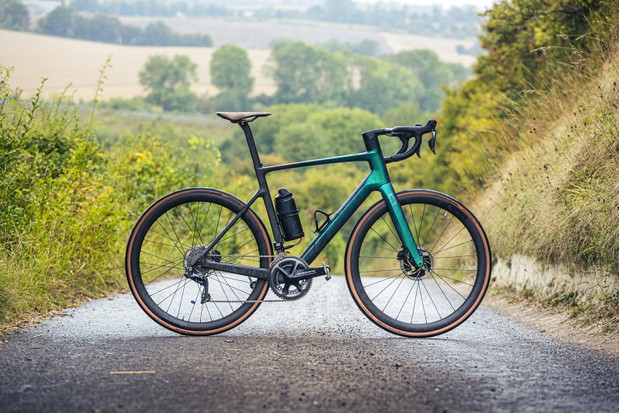
The Scott Addict eRIDE Premium, like its non-assisted Addict RC brother, is undeniably attractive. Immediate Media / Russell Burton
There are a variety of drop-bar ebikes available from well-known manufacturers if you like riding on roads but need a little assistance keeping your pace up or getting up hills.
Many motors and batteries are very inconspicuous, making it difficult to tell whether you’re riding an ebike. Look for motor systems from Fazua, ebikemotion, and Bosch.
Because the lightest road ebikes are about 11kg, you won’t be adding much additional weight.

The Scott Addict eRIDE Premium is almost indistinguishable from the Addict RC standard. Immediate Media / Russell Burton
However, with many road riders hitting speeds of 15 mph or more on the flat, you may feel like you’re dragging dead weight around with the engine shutting off at that maximum aided speed.
It will save battery life, and with proper usage, you may get considerably more mileage out of an ebike system than the usual stated range of 75 kilometers, allowing for more ambitious, longer trips.
Meanwhile, there are a growing number of gravel ebike choices available if you want to ride a broader variety of terrain. They’ll help you handle the tough terrain with larger tyres and greater grip.
Pros: Lightweight and quick on the road (for an electric bike)
Cons: If you’re riding faster than 15 mph, you’ll gain weight for no gain.
Mountain bikes with electric motors
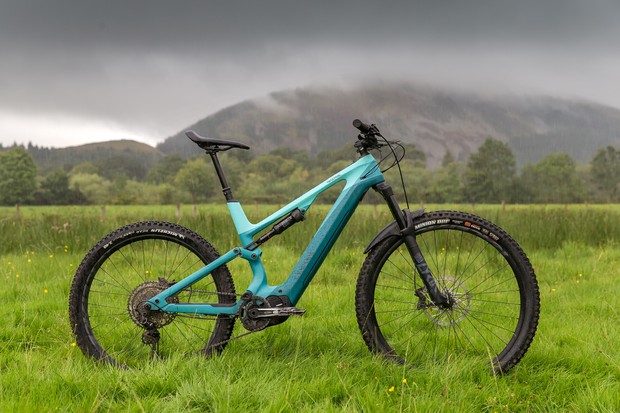
Electric mountain bikes are fantastic on the hills, but they take some getting used to on the descents. Immediate Media / Ian Linton
The attraction of that additional push up slopes is hard to resist for some mountain cyclists.
With more stamina to enjoy the descents, an e-MTB will bring you to the summit faster, especially on difficult, steeper climbs. Plus, if you can climb up the ups more quickly, you’ll have greater range to explore.

Despite the fact that the STEPS E8000 motor only has 75Nm of torque, it is more than enough to winch up steep slopes. Ian Linton is a British actor.
For flat-out riding pleasure, recent advances in e-MTB performance have brought handling closer to that of unpowered mountain bikes.
However, the additional weight may make handling more difficult on more technical parts, so it’s a good idea to back off a little until you have a feel for the bike.
Pros: It’s a lot simpler to get to the top.
Cons: Extra weight may make it difficult to maneuver.
Bicycles that are both electric and hybrid
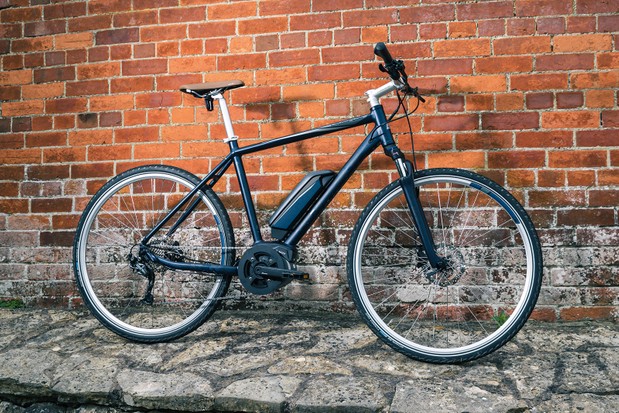
The Carrera Crossfuse has a traditional hybrid posture that makes it perfect for navigating traffic. Immediate Media / Russell Burton
Flat bars and steady handling will be standard on electric hybrid motorcycles. They’re usually the cheapest ebikes, and they’re an excellent place to start if you want to go electric.
Electric hybrids are ideal for commuting to work, riding about town, or taking leisurely rides on bike trails or through parks because of their upright posture.
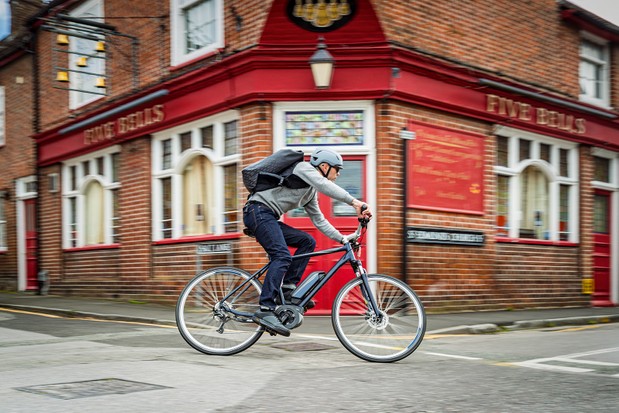
Electric hybrid bikes are ideal for commuting or pleasure riding. Immediate Media / Russell Burton
However, since the motor systems are less complex and the bikes are designed for durability, they are typically towards the heavier end of the ebike range. As a result, carrying them up stairs or over barriers may be difficult, and they may be difficult to store.
There are specialty hybrid ebikes intended for transporting luggage or shopping, in addition to general-purpose hybrid ebikes.
Pros: Comfortable riding posture and adaptability
Cons: When it comes to storage, they are often bulky and unwieldy.
Folding electric bicycles
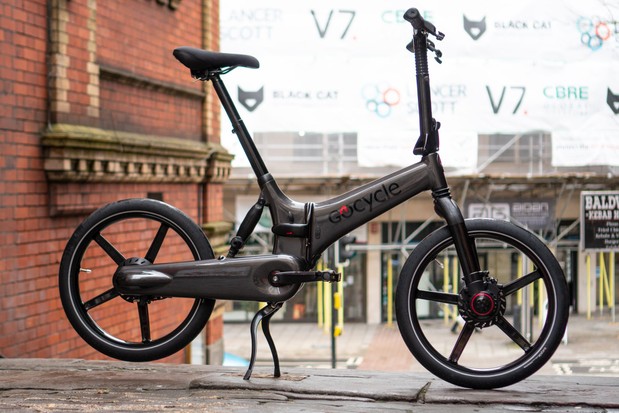
Commuters who use public transportation or have limited room are also catered for. Immediate Media / Oliver Woodman
A small electric folding bike may be the solution if you need to commute or just have limited storage space. Longer bike rides are easier and more comfortable with the engine than with a traditional folding bike.
The battery is typically concealed in the frames of folding ebikes, or they may come with a detachable battery to make getting on and off public transportation a little simpler. A detachable battery also allows you to take it someplace where charging is more convenient (at your desk, for example, if you use the bike to ride to work).
However, because of the additional weight of the motor and battery, transporting a folding ebike on and off public transportation and up and down stairs may be more difficult, and the available range in certain models may be very restricted.
Pros: Ideal for a longer commute; public transportation is available.
Cons: Can be difficult to take on and off public transportation, and range may be restricted.
What should you check for when purchasing an electric bicycle?
Position of the motor
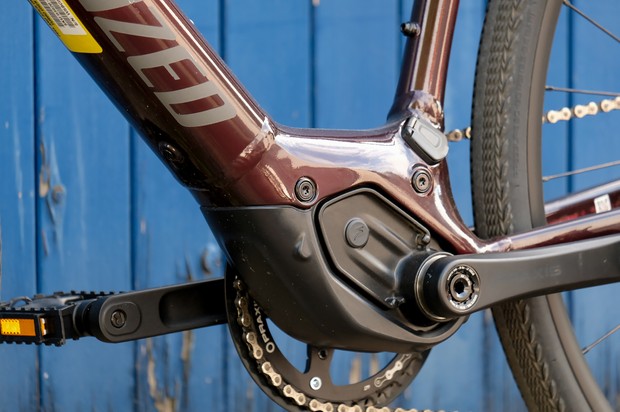
The motor from Specialized is much lighter than most other designs. Immediate Media / Oli Woodman
The motors on electric bikes are located in one of three locations: the center of the bike, the rear hub, or the front hub.
Many systems will use bottom-mounted motors that drive the ebike via the chain. It’s an excellent place for the engine since it keeps the additional bulk low and center in the frame, away from the bike’s stability and handling.
Another common location for the engine is the rear wheel hub. Again, it’s low down, and since so much of the rider’s weight is on the rear wheel, the additional weight and power has little effect on handling and road grip.
Finally, the motor could be installed in the front hub. It’s a little harder in this position since the motor unit may influence steering and there’s less weight on the front tire, so grip may be compromised. It’s often utilized for folding ebikes and hybrids.
You may purchase kits to turn a regular bike into an ebike in addition to ready-built ebikes. In each of these locations, there are kits that utilize a motor. We’ve compiled a list of the most popular electric bicycle conversion kits.
Batteries
A rechargeable lithium-ion battery will power an electric bike. They’re utilized for their low weight and performance, as well as fast recharging – usually in a few hours – much like the batteries in other electric cars.
The bigger the battery capacity, the more distance you can obtain between charges, thus the more costly the ebike, the more mileage you can get.
Batteries come in a variety of forms, sizes, and locations. A common alternative is to bolt the battery to the top of the down tube, although other ebikes have their batteries concealed inside the down tube or even the seat tube, allowing for a more elegant (and usually more costly) solution.
Bottle cage batteries are another option for concealing the battery and are often used as a backup battery to extend range.
The batteries may usually be charged using a regular wall socket, either in situ through a port on the bike or with the battery removed from the bike. Removable battery packs that are secured with a key are extremely popular.
Range of electric bicycles
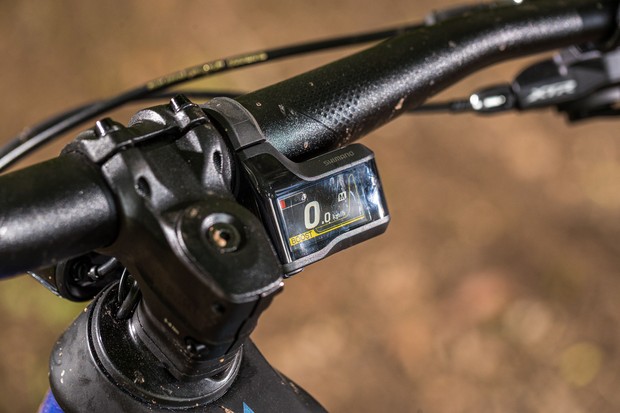
Torque levels may be adjusted in each mode. Burton, Russell
For most ebike users, the question of how far you can ride before your battery dies is less important than how frequently you can ride before you need to recharge it.
Range is determined by your riding style, as well as where and how you ride, as well as the battery capacity. Some ebikes will have several batteries that may go for up to 100 miles on a single charge, while others, especially foldable ebikes intended for easy carrying and folding and for shorter city rides, may only go for 20 miles or less.
As you ride, you’ll be able to choose from a variety of support levels to suit your requirements. You’ll have to exert more effort in an eco or low assist mode, but your battery will last longer.
A greater assist level, on the other hand, is helpful for getting up hills and accelerating more quickly in stop-start situations, but it will deplete your battery much quicker.
Although you still have the extra weight of the motor and battery, you can typically turn the motor off completely to save energy and there will be no more drag with most systems.
Sensors
An ebike will include a variety of sensors to regulate the motor’s output. First, there will be a speed sensor, which will shut off assistance when the vehicle reaches the permitted limit speed.
There will also be cadence and torque sensors to adjust the assistance level to your pedaling input and ensure that an ebike does not run away with you.
Additional advanced systems may include more sensors; the Giant Trance E +1 electric mountain bike, for example, employs five sensors to regulate its output in Smart Assist mode.
There will be a battery and assistance level display, as well as controls to choose the help mode. The display is usually a bar-mounted LED device with speed, distance, and range information. On racier road ebikes, however, more minimalist displays are common, with the front of the top tube being a frequent location.
A smartphone app will be included with many ebikes. More advanced applications will include battery status information, allow you to customize assistance levels, and may incorporate GPS-based route planning and navigation, as well as ride sharing.
Jargon-buster for electric bikes
Level of assistance
How much extra help your engine provides you when riding. Depending on the terrain, most ebikes will have several settings to switch between while riding (and your energy levels). Some will be able to adjust support levels up and down automatically, based on where you’re riding or how much battery life you have left. When you have more power, you have less range.
EAPC
The official legal name for ebikes in the United Kingdom is “Electrically Assisted Pedal Cycle,” which is short for “Electrically Assisted Pedal Cycle.”
Watts
An ebike motor’s output is usually measured in watts. This is a measurement of the highest amount of power it can generate.
Watt-hours are a unit of measurement for
The capacity of an ebike battery is measured in watt hours, or how many watts a battery can produce and for how long. So, if a 250-watt motor was powered by a 250-watt-hour battery and ran at maximum power for an hour, the battery would be depleted. Because your motor doesn’t operate at full power all of the time in practice, your battery will last longer.
Torque
Torque is an essential number for eMTBs in particular. It calculates how much spinning power a motor will generate, which helps you contribute to your own effort while climbing slopes.
A pedelec is a kind of electric bicycle (pedal electric cycle)
An electric bike is sometimes referred to as an e-bike.
Walk mode
If you have to push your ebike, a walk mode will utilize the motor to assist you in moving the bike. Because ebikes are often hefty, it’s advantageous if you need to push your machine a long distance.
For anyone who loves the thrill of riding a bike, electric bike riding is a great way to get out on the open road. All you need is a bike, a helmet, and a license. The following guide to some of the best electric bikes will help you pick the right bike for you.. Read more about best electric bikes under £1000 and let us know what you think.
Frequently Asked Questions
What are the different types of an electric bicycles?
There are three main types of electric bicycles. They are pedal-assist, throttle-only, and pedelec. Pedal-assist bikes use a combination of pedals and motors to provide power assistance.
Throttle-only bikes only have one motor that provides power assistance when the throttle is engaged. Pedelecs are fully electric with no mechanical input from the rider at all.
What is the difference between a Class 1 and Class 2 E-bike?
A Class 1 E-bike is a bike that can go up to 25 miles per hour. A Class 2 E-bike is a bike that can go up to 45 miles per hour.
What type of electric bike is best for me?
Electric bikes are a great option for people who want to commute or travel by bike. They have the ability to go up hills, and can be used on any terrain.



